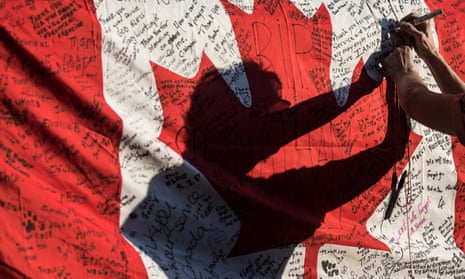A UN human rights body has joined a chorus of criticism against a controversial Canadian anti-terrorism bill and is urging changes to the new legislation.
The Geneva-based UN Human Rights Committee released on Thursday the findings of a periodic review of Canada’s rights obligations under a core international rights treaty.
The concluding observations, which are not legally binding, call on Canada to ensure that Bill C-51, which became law last month, does not have a negative impact on fundamental human rights.
They also requested that the bill provides adequate legal safeguards that information sharing provisions do not lead to rights abuses; establishes oversight mechanisms with the necessary resources for security and intelligence agencies that are “effective and adequate”; provides for “judicial involvement” in the authorization of surveillance measures; and allows people placed on an expanded no-fly list to be informed and able to challenge the decision.
The committee also raised concerns that the use of security certificates – a legal mechanism that can be used by the government to detain and remove non-Canadians, including for national security reasons – could lead to unlawful deportations.
The Conservative government did not reply to requests for comment Thursday, but the Canadian delegation at the UN told the committee earlier this month that “Canada was committed to protecting human rights of all individuals while combatting terrorism” and that “the security certificate regime was subject to numerous safeguards”.
The recommendations were welcomed by Canadian activists who travelled to Geneva earlier this month to raise their concerns of the anti-terror bill and other issues.
Critics have panned the sweeping legislation as excessive and lacking in sufficient oversight mechanisms.
It was introduced by the Conservative government after two fatal attacks on military personnel in Canada linked to terrorism, including the deadly shooting of Corporal Nathan Cirillo in Ottawa in October by gunman Michael Zehaf-Bibeau.
The Canadian Civil Liberties Association, which made their case in Geneva, also launched a domestic legal challenge this week against C-51, alongside Canadian Journalists for Free Expression.
“CCLA will call expert witnesses in its constitutional challenge who will make reference to the Committee’s observations given that it is an independent expert body,” said the group’s executive director, Sukanya Pillay, in a statement Thursday.
The UN committee also criticised Canada over its treatment of aboriginals, from their high rates of incarceration to violence against indigenous women and girls.
The UN body urged the Canadian government to call a national inquiry into Canada’s missing and murdered indigenous women – not the first time a UN body has done so.
In March, the UN Committee on Elimination of Discrimination against Women recommended an inquiry, as did the UN Special Rapporteur on Indigenous Rights, in 2014.
The Conservatives have steadfastly refused repeated calls for a nationwide probe.
Canada’s UN delegation told the committee that violence against aboriginal women and girls was “an issue which Canada took very seriously (and) had a devastating impact on individuals, families and communities across the country”, and it noted the government had started investing federal funds into shelters and law enforcement and was working with provincial counterparts to address the issue.
The last time the human rights body checked in on whether Canada was meetings its obligations under the International Covenant on Civil and Political Rights – one of the UN’s core international rights treaties – was in 2006.

Comments (…)
Sign in or create your Guardian account to join the discussion